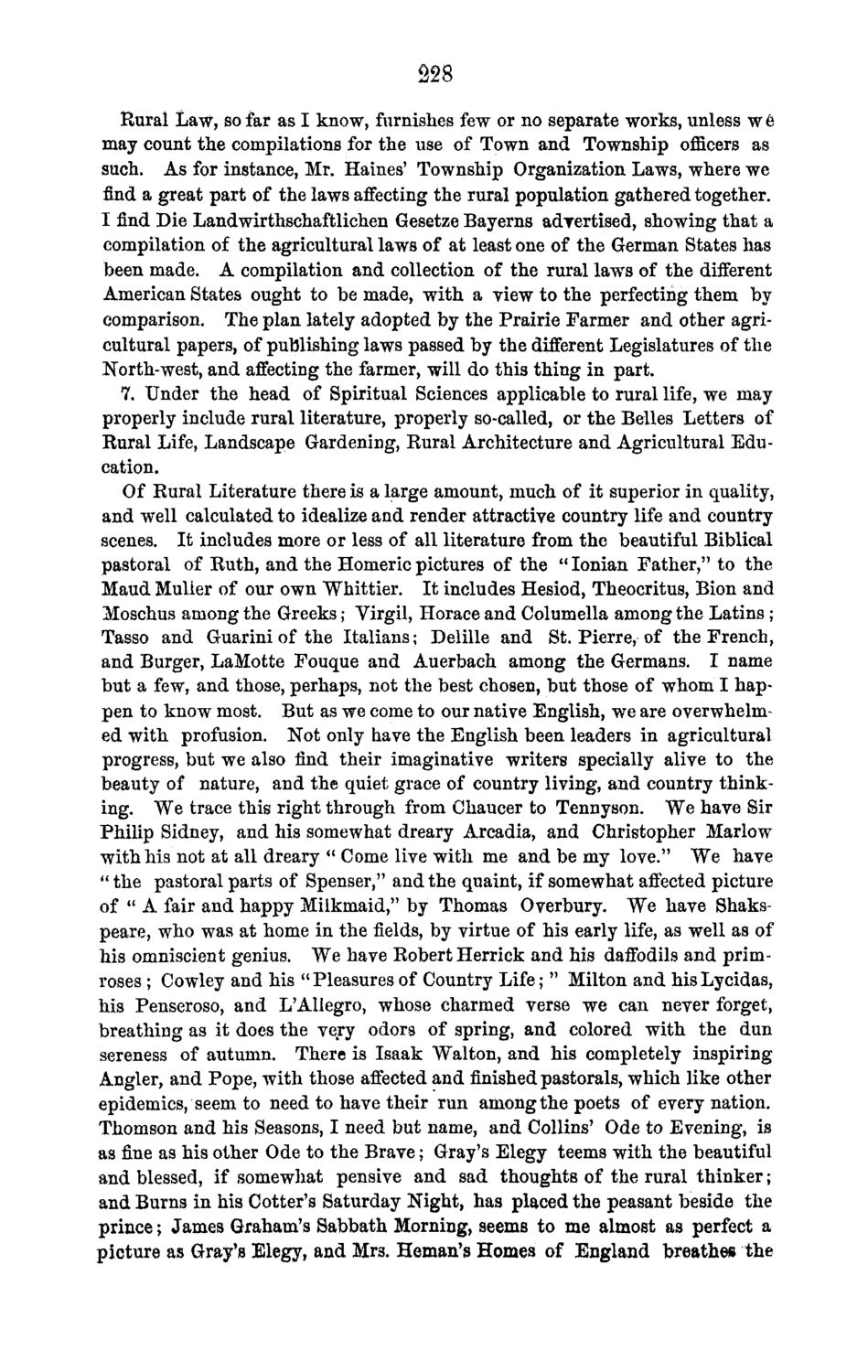| |
| |
Caption: Board of Trustees Minutes - 1870
This is a reduced-resolution page image for fast online browsing.

EXTRACTED TEXT FROM PAGE:
228 Rural Law, so far as I know, furnishes few or no separate works, unless w G may count the compilations for the use of Town and Township officers as such. As for instance, Mr. Haines' Township Organization Laws, where we find a great part of the laws affecting the rural population gathered together. I find Die Landwirthschaftlichen Gesetze Bayerns advertised, showing that a compilation of the agricultural laws of at least one of the German States has been made. A compilation and collection of the rural lawrs of the different American States ought to be made, with a view to the perfecting them by comparison. The plan lately adopted by the Prairie Farmer and other agricultural papers, of publishing laws passed by the different Legislatures of the North-west, and affecting the farmer, will do this thing in part. 7. Under the head of Spiritual Sciences applicable to rural life, we may properly include rural literature, properly so-called, or the Belles Letters of Rural Life, Landscape Gardening, Rural Architecture and Agricultural Education. Of Rural Literature there is a large amount, much of it superior in quality, and well calculated to idealize and render attractive country life and country scenes. It includes more or less of all literature from the beautiful Biblical pastoral of Ruth, and the Homeric pictures of the " Ionian Father," to the Maud Mulier of our own Whittier. It includes Hesiod, Theocritus, Bion and Moschus among the Greeks; Virgil, Horace and Columella among the Latins; Tasso and Guarini of the Italians; Delille and St. Pierre, of the French, and Burger, LaMotte Fouque and Auerbach among the Germans. I name but a few, and those, perhaps, not the best chosen, but those of whom I happen to know most. But as we come to our native English, we are overwhelmed with profusion. Not only have the English been leaders in agricultural progress, but we also find their imaginative writers specially alive to the beauty of nature, and the quiet grace of country living, and country thinking. We trace this right through from Chaucer to Tennyson. We have Sir Philip Sidney, and his somewhat dreary Arcadia, and Christopher Marlow with his not at all dreary " Come live with me and be my love." We have " the pastoral parts of Spenser," and the quaint, if somewhat affected picture of " A fair and happy Milkmaid," by Thomas Overbury. We have Shakspeare, who was at home in the fields, by virtue of his early life, as well as of his omniscient genius. We have Robert Herrick and his daffodils and primroses ; Cowley and his " Pleasures of Country Life; " Milton and his Lycidas, his Penseroso, and L'Allegro, whose charmed verse we can never forget, breathing as it does the very odors of spring, and colored with the dun sereness of autumn. There is Isaak Walton, and his completely inspiring Angler, and Pope, with those affected and finished pastorals, which like other epidemics, seem to need to have their run among the poets of every nation. Thomson and his Seasons, I need but name, and Collins' Ode to Evening, is as fine as his other Ode to the Brave; Gray's Elegy teems with the beautiful and blessed, if somewhat pensive and sad thoughts of the rural thinker; and Burns in his Cotter's Saturday Night, has placed the peasant beside the prince; James Graham's Sabbath Morning, seems to me almost as perfect a picture as Gray's Elegy, and Mr3. Heman's Homes of England breathe* the
| |